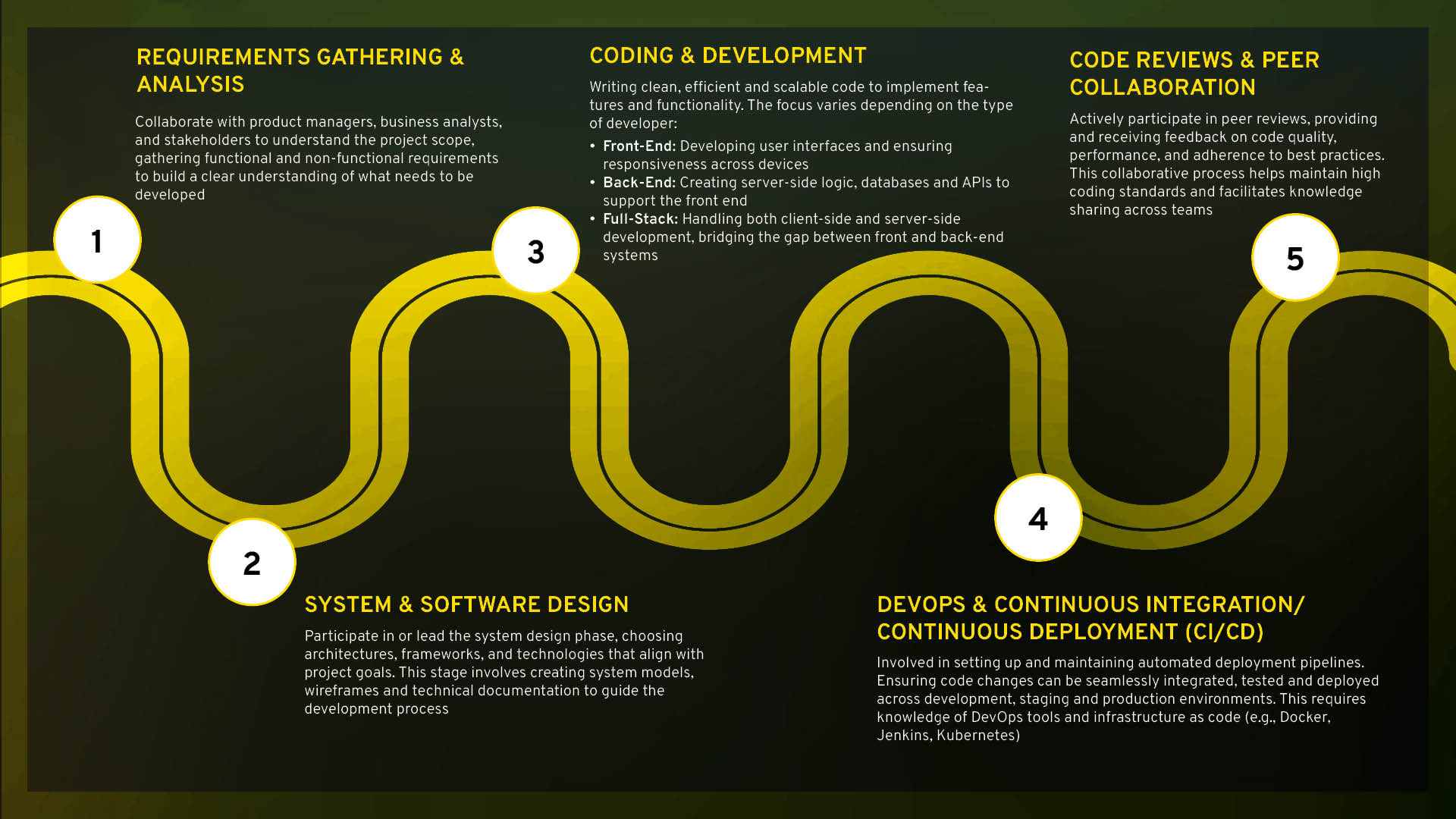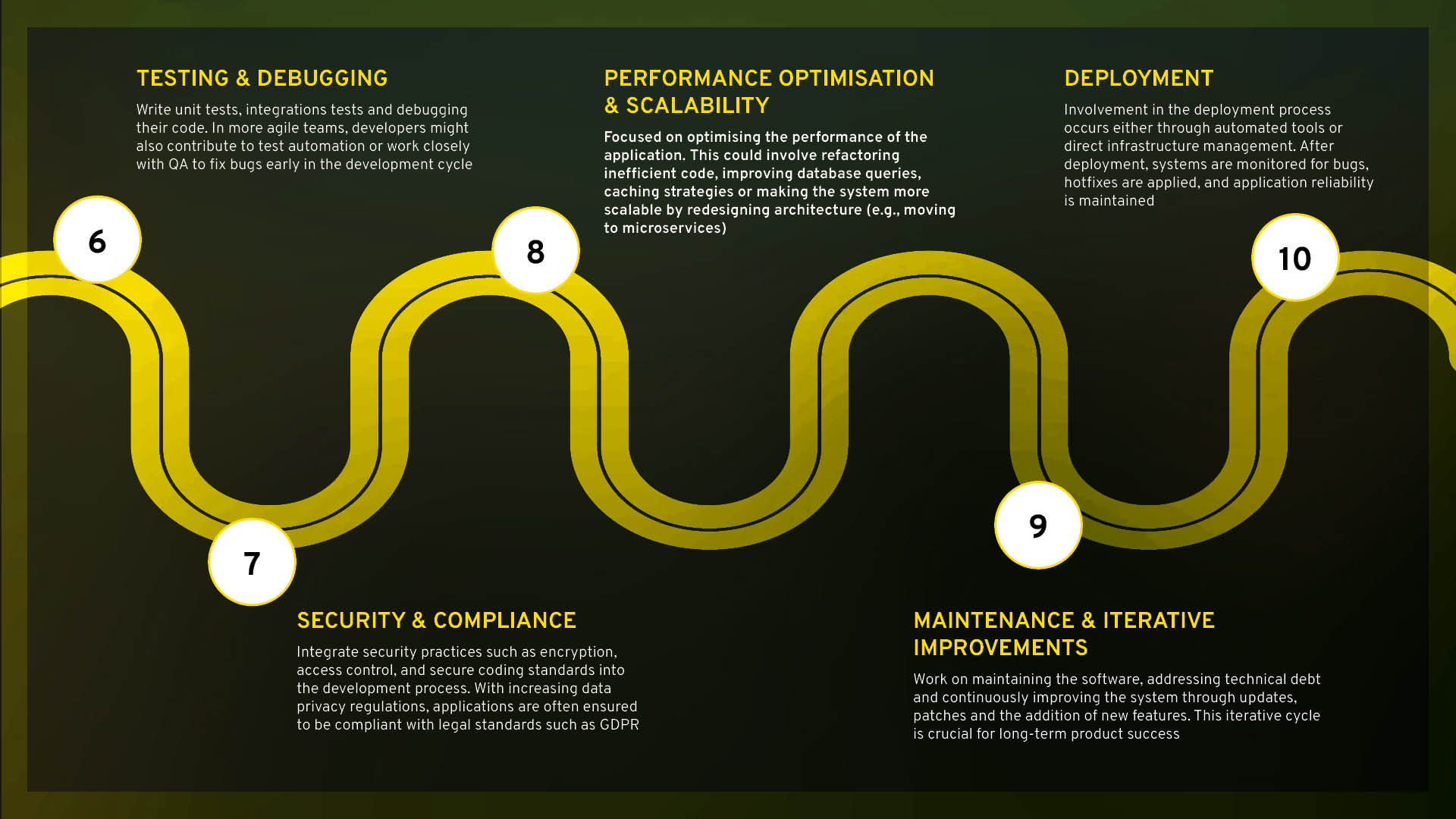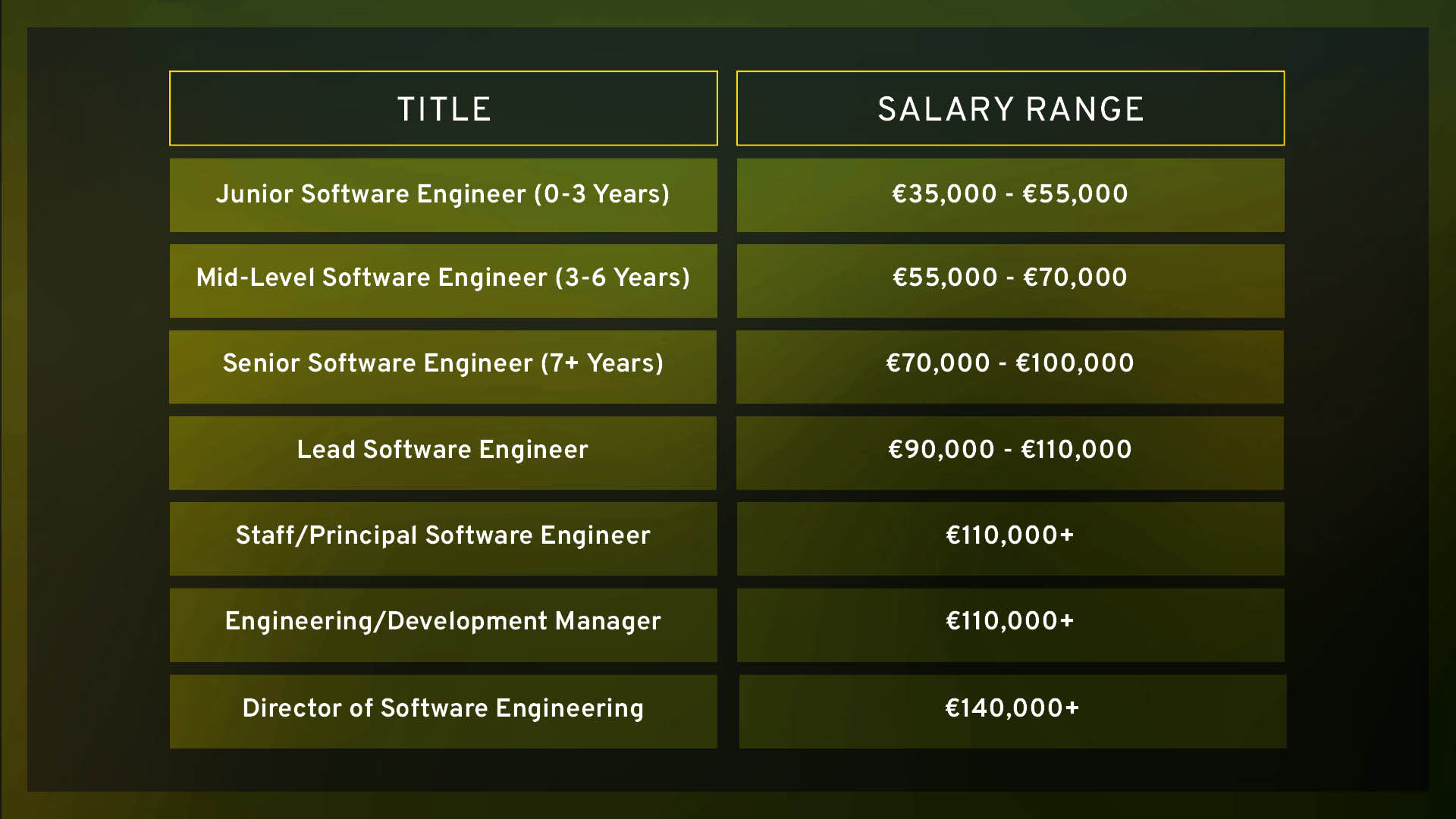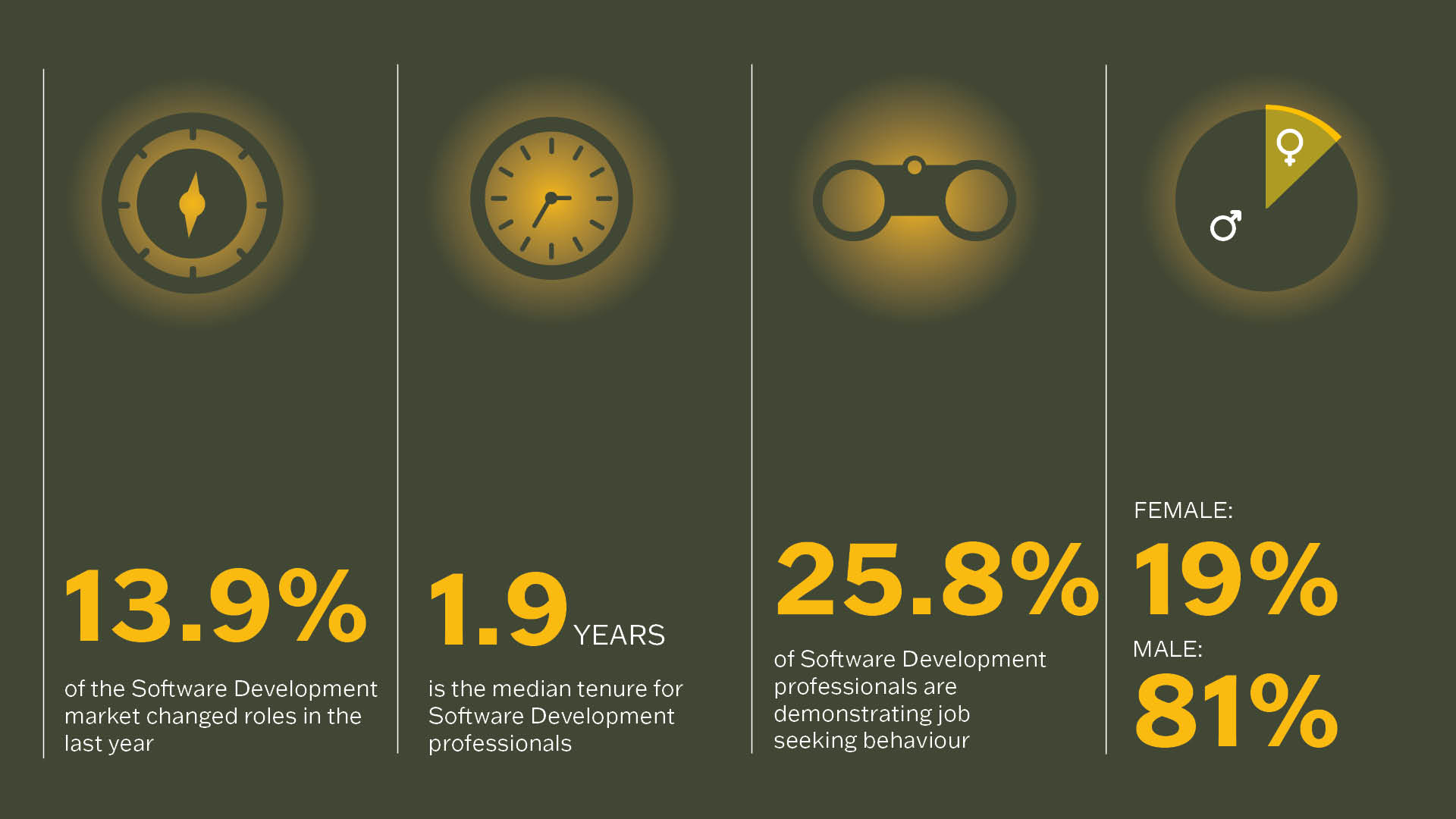The software development market in Ireland is constantly evolving, presenting both challenges and opportunities for businesses and developers. Companies are competing to attract top talent, while developers must continuously adapt to emerging technologies to stay ahead.
Drawing on our experience with hiring managers and talent, we’ve identified some critical focus areas that will shape the industry in the coming months.
#1 Software Development Continuum of Activity
Software development roles have expanded significantly. Today’s developers go beyond coding, integrating skills in areas like DevOps, Cloud, Security, Machine Learning, and Systems Architecture. These roles demand expertise beyond traditional programming.
It’s important to recognise the balance of activities in a software developer’s role. The continuum below highlights the range of tasks in the software development lifecycle. Understanding this balance highlights the importance of context when evaluating roles, as not all developers engage in every step.


#2 Variables Shaping Software Development Roles
A developer’s role depends on company size, project complexity, and technical specialisation – factors that hiring managers should consider when matching talent to the right opportunities.
-
Company Size: In startups, developers often wear multiple hats, gaining broad, hands-on experience. In larger organisations, they specialise in areas like enterprise systems, high-traffic platforms, or regulated industries, building deep expertise.
-
Project Complexity: Experience with scalable applications, cloud platforms, microservices, and both greenfield and legacy systems is highly valuable. Product type also matters – consumer apps lean on front-end and mobile skills, while enterprise solutions require backend, security, and compliance expertise.
-
Technical Specialisation: Frontend, backend, fullstack, and AI-focused skills all play a role. Developers who combine strong engineering fundamentals with AI literacy – including generative and agentic AI tools – are increasingly in high demand.
By focusing on these core factors, hiring managers can align talent with the right projects, responsibilities, and growth opportunities.
#3 Salary Insights: Software Development in 2025
The software development job market in Ireland continues to be highly competitive, particularly for specialised roles. Salaries can vary significantly depending on factors such as company size*, industry, location**, technical expertise, and leadership experience. The following salary ranges are general guidelines; actual compensation will vary based on individual factors.
 *Larger multinational technology companies often offer base salaries circa 20% above the market rate, along with restricted stock units (RSUs) that can push total compensation above that of competitors.
*Larger multinational technology companies often offer base salaries circa 20% above the market rate, along with restricted stock units (RSUs) that can push total compensation above that of competitors.
** Salaries also vary by region, with Dublin typically offering compensation around 15-20% higher than other regions.
#4 AI & Software Engineering: Key Hiring Insight
AI has shifted from experimental technology to a core part of software development. Engineers are now expected to integrate AI into production systems – applications, APIs, and cloud infrastructure – while ensuring reliability, scalability, and usability.
What to Look For
The strongest signals of AI-ready talent include:
- Experience building AI systems in full-stack or microservice environments.
- Hands-on integration of retrieval-augmented pipelines and multi-agent frameworks (e.g., LangChain, LlamaIndex).
- Practical knowledge of LLMOps, including monitoring, evaluation, and safe deployment.
- Ability to balance trade-offs such as latency, cost, and accuracy while maintaining engineering standards.
Engineers who combine AI literacy with strong engineering fundamentals are in very high demand and often able to command premium salaries. Identifying talent with production-ready experience and the ability to turn AI into usable products is now critical for staying competitive in 2026.
#5 Current Snapshot of the Software Development Talent Pool
Here’s what we’ve noticed this quarter in the Software Development talent pool in Ireland:

#6 Other Trends for 2026
While AI dominates the software development landscape, other trends continue to shape how teams build, deploy, and maintain software. Companies are looking for developers who can combine deep technical expertise with an understanding of emerging methodologies and best practices.
Cloud & DevOps
Cloud platforms and DevOps practices remain essential for building scalable, resilient infrastructure. Engineers with experience in cloud-native architectures, microservices, CI/CD pipelines, and Infrastructure-as-Code (IaC) are in high demand. Today, virtually every organisation leverages cloud technology in some form. Developers who can design, deploy, and maintain cloud-based solutions are in high demand.
Security
Security is no longer optional – it is a fundamental requirement throughout the software development lifecycle. Developers must integrate security best practices at every stage, from coding and testing to deployment and maintenance. With growing awareness around GDPR, data protection, and the risks introduced by AI-powered systems, end-to-end security has become a non-negotiable expectation.
Emerging Technologies & Practices
Beyond AI, cloud, and security, several other trends are gaining traction:
- Low-code & no-code platforms
- Edge computing and real-time analytics
- Sustainability
Developer Experience & Work Culture
Hybrid and flexible work arrangements remain central to attracting and retaining talent. Developers value collaborative cultures, opportunities for continuous learning, and environments that prioritise well-being and productivity. Companies that balance cutting-edge technology with supportive, flexible workplaces will be best positioned to thrive this year.
In short, while AI is transforming how software is built, the fundamentals of cloud infrastructure, DevOps, security, and modern engineering practices remain critical. Developers and teams that combine these skills with AI expertise will be the most competitive and valuable in the evolving landscape.
In Barden, we understand that each team, role, and requirement is unique. If you would like to discuss what tactics and approaches would suit you, please feel free to contact Rachel McGuckian, our Software Development Talent Advisor & Recruiter here in Barden (rachel.mcguckian@barden.ie); we’re where leaders go before they start looking for Software Development talent.
This information is accurate as per January 2026 and will be updated periodically. Data sources include Barden Proprietary Data, LinkedIn Analytics and other 3rd party data sources. If you have a request and would like real-time information to inform your hiring decisions, contact Rachel McGuckian at rachel.mcguckian@barden.ie.


 Jump Back
Jump Back

